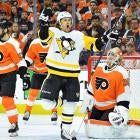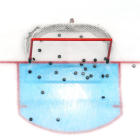The Philadelphia Flyers are dead.
The Flyers-Penguins series was the most bizarre and chaotic of the first round matchups, which shouldn't really come as much of a surprise. It was a series mostly consisting of sloppy play and blowouts, but Sunday's Game 6 finally brought some decent entertainment value -- even if it was very ugly entertainment.
In the end, that sixth game was the last of the Flyers' season; Pittsburgh will move on to pursue a third consecutive Stanley Cup. Here's your updated NHL playoffs bracket.
Let's take a look at where things went wrong for the Flyers.
Stop. Giving. Up. Five. Goals.
The Flyers played the Penguins 10 times this season. Here's a fun little fact: When they didn't allow the Penguins to score five goals or more, they went 2-0. When they did allow the Penguins to score five goals or more, they went 0-8. (EIGHT!)
I'm not a hockey genius by any stretch, but it sure seems like if you're breaking down this Flyers team's demise, a good place to start is their insane love for giving up a handful of goals. They're probably going to want to work on that.
Sloppy defensive play
It's been a problem all year long, but you don't really need to look any further than Game 6 to see just how bad it can be for the Flyers.
In a do-or-die game at home, the Flyers came out of the gate hot on home ice and looked like they were in good shape to force a Game 7, but they let things get away from them as the game went on. They had a number of absolutely horrid defensive breakdowns that gifted the Penguins scoring opportunities, and Pittsburgh took advantage -- scoring eight goals.
You're not going to win many games if you're giving up eight goals. Just my take.
Let's take a look at how some of those Pittsburgh goals came to be.
On the Penguins' second goal of the game, Carl Hagelin was left completely wide open directly in front of the Philadelphia net.
Then, about a minute after Scott Laughton had just scored the Flyers' third consecutive goal to give Philly a 4-2 lead in the second period, the Flyers let the Penguins back in the game thanks to a bad play from defenseman Radko Gudas. (You're about to be hearing a lot of this name.) With the puck on his stick and the Flyers looking to break out, Gudas made a bad pass leading to a defensive zone turnover.
Those are always bad, but they're especially bad when Sidney Crosby, Jake Guentzel and Patric Hornqvist are on the ice.
But wait, there's more.
The game-tying goal came in the final minute of the second period, and Gudas once again played a major role. After gaining possession in the defensive zone, Gudas did this...
...which eventually led to this.
Awful turnover. Taking a bad angle and getting beaten to the puck. Chasing a guy out of position and letting Guentzel set up shop in front of the net. All things that are very much not conducive to winning. It was a miserable second period for Gudas.
But things were tied heading into the final intermission and the Flyers still had a chance if they could just get their act together and play smart and tight.
Fast forward to 30 seconds into the third period, this is what the Flyers did.
That's Ivan Provorov coughing up the puck in just a tremendously bad unforced error. Provorov, who was clearly playing hurt, gifted a brilliant opportunity to Phil Kessel and Guentzel, who converted for a lead that the Penguins never surrendered. We should've known there was no coming back from that, but Guentzel went on to add two more and Pittsburgh was well in the clear.
It's important to remember that all of these brutal zone plays came just from Game 6. There's not a whole lot of room for error in the Stanley Cup playoffs -- a single one of those plays can shift a series -- and there's even less when you're talking about an elimination game. The Flyers stood no chance of winning a must-win game because of how many times they shot themselves in the foot.
Sidney Crosby and Jake Guentzel
For as bad as the Flyers' defense was, you have to give some credit to the Penguins for executing on those gifted opportunities. First and foremost, Sidney Crosby and Jake Guentzel deserve a boatload of praise.
Each of those guys notched 13 points in the series (six goals and seven assists apiece) and were instrumental in leading their team to victory, especially with Evgeni Malkin out of the lineup in Game 6. Guentzel deposited four goals in that final game, adding another big game performance to his resumé, and he's still just 23 years old. He's a guy that just seems to find it in big moments.
Crosby had a goal in every Penguins win in the series (probably not a coincidence), including a hat trick in Game 1. With the Pens' cross-state rivals chanting "Crosby sucks!" and sticking his picture in urinals at Wells Fargo Center, Crosby did what he could to shut them up, and they're pretty quiet now.
Sidney Crosby opens the scoring with his fourth goal of the series pic.twitter.com/5VWO0jb6jm
— Pete Blackburn (@PeteBlackburn) April 15, 2018
When Sid is on his game he makes everyone better around him, and that's hard to beat in the playoffs -- as we've seen over the last two postseasons. The Penguins don't look quite as impressive (yet) this year as they have in the past two playoff runs, so they'll need Crosby to keep performing and producing at an elite level, especially if Malkin isn't himself if and when he comes back from injury.
Philadelphia goaltending
The Flyers used three goaltenders in this series. None of them finished with a save percentage above .900.
Brian Elliott started four games, lost three of them and had a save percentage of .856. He gave up goals like this.
Brian Elliott. Whoops! pic.twitter.com/IBxBFhurco
— Pete Blackburn (@PeteBlackburn) April 18, 2018
Petr Mrazek, who the Flyers acquired for goaltending help mid-season, didn't provide much goaltending help. He saw action in one game, stopping 12 of 14 shots. That's a .857 save percentage.
Michal Neuvirth got the final two starts of the series, and he was the best of the three. After stopping 11 of 13 in relief in Game 4, he saved 30 of 32 for a big win in Game 5. Then he gave up seven goals on 27 shots in Game 6, bringing his series save percentage down to .847.
Not great.
It's almost impossible to win in the playoffs without really solid goaltending to occasionally bail you out, and the Flyers were entirely without that in this series. That seems to be a recurring theme for this team. I would imagine Philadelphia fans are counting down the days until Carter Hart takes the reigns in net.
Special teams play
We knew that the Flyers would have their hands full on special teams in this series. The Penguins finished the regular season with the top power-play unit in the league, and the Flyers' penalty kill was third-worst in the NHL. That is not a recipe for success.
And while Pittsburgh did have a decent showing on the man-advantage -- they went five-for-25 -- the real clunker ended up being Philly's own power play.
Both the Flyers' power play and the Penguins' penalty kill finished in the middle of the pack during the regular season, but Philadelphia couldn't muster much offense at all while on the advantage in this series. They ended up going just two-for-21.
It particularly came back to bite them late in Game 6 when they had a golden opportunity to tie the game on a 5-on-3 in the third period. They weren't able to convert and grab some momentum back from the Pens, and then Jake Guentzel ripped off two quick goals to increase Pittsburgh's lead to three shortly thereafter. It was a major turning point.
![[object Object] Logo](https://sportshub.cbsistatic.com/i/2020/04/22/e9ceb731-8b3f-4c60-98fe-090ab66a2997/screen-shot-2020-04-22-at-11-04-56-am.png)


















